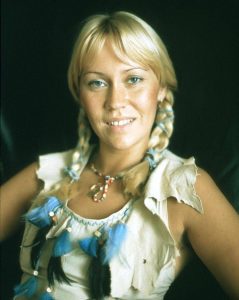It’s almost hard to believe that ABBA, the legendary Swedish pop group, first came together in 1972. More than just a band, ABBA became a global sensation from 1974 to 1983, producing a series of chart-topping hits that are still played and celebrated around the world today. Their music, characterized by its infectious melodies and distinct harmonies, has stood the test of time and remains a staple on countless playlists.

Agnetha Fältskog, one of the group’s iconic members, brought not only her striking vocals to the mix but also her songwriting talent. Her musical journey actually began well before ABBA took off. Starting her solo career in 1968, she was already a recognized artist in Sweden by the time ABBA was formed. Agnetha’s voice and style added a unique charm to the group, complementing the contributions of Anni-Frid Lyngstad, Benny Andersson, and Björn Ulvaeus.
Over the years, ABBA’s influence has been nothing short of monumental. They’ve sold over 380 million albums and singles globally, firmly establishing their place as one of the most successful music acts in history. While the group dominated international charts, Agnetha also pursued her own musical path. Although her solo career didn’t quite reach the same global recognition, she still achieved notable accomplishments. After ABBA’s initial disbandment, she released five solo albums and even made a remarkable comeback in 2013 with new music that reminded fans of her enduring talent.
Despite her fame, Agnetha has always preferred to lead a more private life, particularly after the height of ABBA’s fame. In the 1990s, she stepped away from the spotlight, focusing on her personal well-being and taking a break from the constant attention that came with being a global icon. She recently celebrated her 75th birthday, and fans were pleased to see that she continues to age with grace and elegance. Though she hasn’t been actively releasing music in recent years, her fans continue to hope for another surprise release in the future.
Born in 1950 in Sweden, Agnetha grew up in a household where music played a central role. She has one sister and was heavily influenced by her father, who had a strong interest in music and the entertainment industry. This early exposure helped shape Agnetha’s love for music and performance. At the young age of six, she wrote her very first song, titled “Two Little Trolls,” showcasing her creativity and early passion. By the age of eight, she had begun piano lessons, and just two years later, she was already forming a musical group with her childhood friends.
Before her big break with ABBA, Agnetha held a job as a telephone operator for a car company, juggling work and her music career. But as ABBA’s popularity skyrocketed, she made the decision to fully commit to her musical ambitions. Within two years of joining the band, a music producer took notice of her solo potential. She signed with Capitol Records and released her debut single in 1967, which sold over 80,000 copies—a major success in Sweden at the time. That early success laid the foundation for her becoming one of the country’s most beloved music stars.
In 1971, she began a relationship with fellow bandmate Björn Ulvaeus. Along with their friends Benny Andersson and Anni-Frid Lyngstad, they formed what would soon become a legendary group. Their big breakthrough came in 1974 with the release of “Waterloo,” a hit that propelled them into international stardom after winning the Eurovision Song Contest.
Agnetha often spoke fondly of her time in ABBA. She once said, “We had such a wonderful time because we were all incredibly talented. Each of us brought something unique to the table. I had many ideas for the chorus and little details that would enhance the songs. Adding a special touch to every track was my role.” Her contributions to the band extended beyond her voice—she had a creative influence that helped shape many of ABBA’s memorable songs.
During her time with the band, Agnetha and Björn started a family, which occasionally led to delays in performances and recordings due to her pregnancies. Even after their divorce in 1979, they remained committed to the group and worked together professionally to keep ABBA going strong.
Juggling motherhood and a pop career wasn’t easy, but Agnetha always tried to find balance. Touring the world could be exhausting, and she often expressed how comforting it was to return home afterward. The contrast between the glamorous world of show business and the quiet of home life was something she cherished.
As ABBA’s original run came to an end, Agnetha began reflecting more deeply on life and time. Approaching middle age, she admitted feeling anxious about aging. She shared, “I went through some tough periods and felt the need to step back. This was before I turned 50, and I sensed that time was flying by. Reaching 50 felt like a significant milestone, so for a couple of years, I felt I had accomplished so much that I needed to concentrate on myself.”
Her journey hasn’t always been easy. Fame brought both joy and hardship, but through it all, Agnetha remained resilient. Today, she lives a more peaceful life, away from the bright lights and screaming crowds. And while she may have aged, she has done so with beauty and grace. She’s a reminder that true talent never fades and that passion can endure across generations.
Though she may no longer dominate the charts, Agnetha Fältskog remains an inspiration to fans around the world. Her music, both with ABBA and as a solo artist, continues to bring joy to millions. And who knows? Maybe one day, she’ll step back into the studio and surprise us all with a new melody—something only Agnetha could deliver with such heart.





